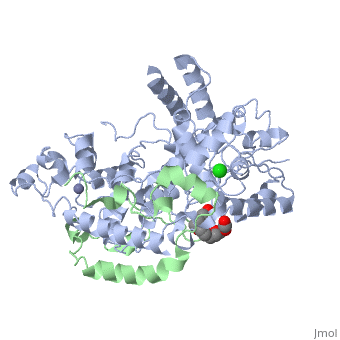Period circadian protein
From Proteopedia
(Difference between revisions)
| (6 intermediate revisions not shown.) | |||
| Line 4: | Line 4: | ||
== Function == | == Function == | ||
| - | Period circadian protein (PER) is essential for the biological clock function. An increase in PER leads to shortening of the circadian rhythms and its decrease leads to lengthening of it. | + | '''Period circadian protein''' (PER) is essential for the biological clock function. An increase in PER leads to shortening of the circadian rhythms and its decrease leads to lengthening of it. |
| + | *'''PER1''' has a role in regulation of genes involved in renal sodium reabsorption and in blood pressure control<ref>PMID:22526258</ref>. | ||
| + | *'''PER2''' may affect neurobiological activities like sleeping, depression and addictionis the primary circadian pacemaker in the brain<ref>PMID:29223143</ref>. | ||
| + | *'''PER3''' is the primary circadian pacemaker in the brain | ||
| + | |||
== Disease == | == Disease == | ||
| Line 12: | Line 16: | ||
== Structural highlights == | == Structural highlights == | ||
| - | There are numerous interactions between PER and cryptochrome. The <scene name='77/774060/Cv/3'>strongest are those formed by the cryptochrome terminal helix</scene> and by the <scene name='77/774060/Cv/4'>Zn+2 ion which forms tetrahedral interactions: 2 with PER and 2 with cryptochrome</scene><ref>PMID:24855952</ref>. | + | There are numerous interactions between PER and cryptochrome. The <scene name='77/774060/Cv/3'>strongest are those formed by the cryptochrome terminal helix</scene> and by the <scene name='77/774060/Cv/4'>Zn+2 ion which forms tetrahedral interactions: 2 with PER and 2 with cryptochrome</scene><ref>PMID:24855952</ref>. <scene name='77/774060/Cv/5'>Cl coordination site</scene>. Water molecules are shown as red spheres. |
</StructureSection> | </StructureSection> | ||
| Line 19: | Line 23: | ||
Updated on {{REVISIONDAY2}}-{{MONTHNAME|{{REVISIONMONTH}}}}-{{REVISIONYEAR}} | Updated on {{REVISIONDAY2}}-{{MONTHNAME|{{REVISIONMONTH}}}}-{{REVISIONYEAR}} | ||
| + | [[6of7]] – hPER2 residues 1093-1212 + cryptochrome-1 – human <br /> | ||
[[4dj2]] – mPER1 homolog Cry domain – mouse <br /> | [[4dj2]] – mPER1 homolog Cry domain – mouse <br /> | ||
[[4ct0]] – mPER2 homolog Cry domain + cryptochrome-1 <br /> | [[4ct0]] – mPER2 homolog Cry domain + cryptochrome-1 <br /> | ||
Current revision
| |||||||||||
3D Structures of period circadian protein
Updated on 21-July-2024
6of7 – hPER2 residues 1093-1212 + cryptochrome-1 – human
4dj2 – mPER1 homolog Cry domain – mouse
4ct0 – mPER2 homolog Cry domain + cryptochrome-1
4u8h – mPER2 homolog Cry domain + cryptochrome-2
3gdi – mPER2 homolog PAS domain
4dj3 – mPER3 homolog residues 108-411
3rty, 1wa9, 3gec – PER PAS domain – Drosophila melanogaster
References
- ↑ Stow LR, Richards J, Cheng KY, Lynch IJ, Jeffers LA, Greenlee MM, Cain BD, Wingo CS, Gumz ML. The circadian protein period 1 contributes to blood pressure control and coordinately regulates renal sodium transport genes. Hypertension. 2012 Jun;59(6):1151-6. PMID:22526258 doi:10.1161/HYPERTENSIONAHA.112.190892
- ↑ Kim M, de la Peña JB, Cheong JH, Kim HJ. Neurobiological Functions of the Period Circadian Clock 2 Gene, Per2. Biomol Ther (Seoul). 2018 Jul 1;26(4):358-367. PMID:29223143 doi:10.4062/biomolther.2017.131
- ↑ Chen ST, Choo KB, Hou MF, Yeh KT, Kuo SJ, Chang JG. Deregulated expression of the PER1, PER2 and PER3 genes in breast cancers. Carcinogenesis. 2005 Jul;26(7):1241-6. Epub 2005 Mar 24. PMID:15790588 doi:http://dx.doi.org/10.1093/carcin/bgi075
- ↑ Schmalen I, Reischl S, Wallach T, Klemz R, Grudziecki A, Prabu JR, Benda C, Kramer A, Wolf E. Interaction of Circadian Clock Proteins CRY1 and PER2 Is Modulated by Zinc Binding and Disulfide Bond Formation. Cell. 2014 May 22;157(5):1203-15. doi: 10.1016/j.cell.2014.03.057. PMID:24855952 doi:http://dx.doi.org/10.1016/j.cell.2014.03.057

